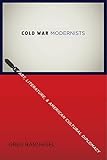Cold War Modernists Art, Literature, and American Cultural Diplomacy.
Material type: TextPublication details: New York : Columbia University Press, (c)2015.Description: 1 online resource (337 pages)Content type:
TextPublication details: New York : Columbia University Press, (c)2015.Description: 1 online resource (337 pages)Content type: - text
- computer
- online resource
- 9780231538626
- Propaganda
- United States
- Modernism (Aesthetics) -- Political aspects -- United States -- History -- 20th century
- Propaganda -- United States -- History -- 20th century
- Cold War -- Political aspects -- United States
- Art -- Political aspects -- United States -- History -- 20th century
- Politics and literature -- United States -- History -- 20th century
- E169 .C653 2015
- COPYRIGHT NOT covered - Click this link to request copyright permission: https://lib.ciu.edu/copyright-request-form
| Item type | Current library | Collection | Call number | URL | Status | Date due | Barcode | |
|---|---|---|---|---|---|---|---|---|
 Online Book (LOGIN USING YOUR MY CIU LOGIN AND PASSWORD)
Online Book (LOGIN USING YOUR MY CIU LOGIN AND PASSWORD)
|
G. Allen Fleece Library ONLINE | Non-fiction | E169.12 .294 2015 (Browse shelf(Opens below)) | Link to resource | Available | ocn902419278 |
Description based upon print version of record.
Includes bibliographies and index.
Table of Contents; Abbreviations and Note on Unpublished Sources; Acknowledgments; Introduction; 1. Freedom, Individualism, Modernism; 2. "Advancing American Art": Modernist Painting and Public-Private Partnerships; 3. Cold Warriors of the Book: American Book Programs in the 1950s; 4. Encounter Magazine and the Twilight of Modernism; 5. Perspectives USA and the Economics of Cold War Modernism; 6. American Modernism in American Broadcasting: The Voice of (Middlebrow) America; Conclusion; Notes; Index
American cultural diplomats of the 1940s and 1950s sought to show European intellectuals that the United States had more to offer than military power and commercial exploitation. Through magazines, traveling art exhibits, touring musical shows, radio programs, book translations, and conferences, they deployed the revolutionary aesthetics of modernism to proveparticularly to the leftists whose Cold War loyalties they hoped to securethat American art and literature were culturally rich and politically significant. Yet by repurposing modernism, American diplomats and cultural authorities rema.
COPYRIGHT NOT covered - Click this link to request copyright permission:
There are no comments on this title.
